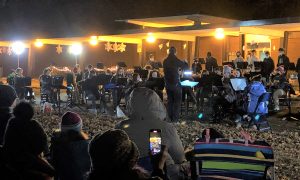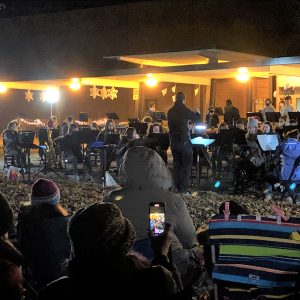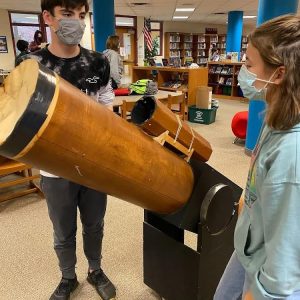
Eighth Grader Ethan Colko (Black sweatshirt) playing the role of one of the officers on the witness stand while Antonio Simmons (Right) guides him through the police record. (Photo by Peter Currier)
WESTFIELD- Eighth graders from Westfield Middle School were shown what it is like to go through a criminal trial Friday morning as part of a program put on by the Hampden County District Attorney’s Office.
Antonio Simmons, the Director of Community Safety and Outreach for the District Attorney, as well as Assistant District Attorneys Ingrid Frau and Clarissa Wright came to Crystal Hollister’s eighth grade class to conduct a mock trial based on a real court case. The mock trial was a part of the District Attorney’s Offices’ Adopt-a-Class program. As a part of the program, two classes are ‘adopted’ by the District Attorney’s office so they can be taught about civics, the constitution, and court cases. The District Attorney also donates school supplies to the selected classes who, this year, were Hollister’s class and another eighth grade class in Agawam.

Left to right: Clarissa Wright and Ingrid Frau, Assistant District Attorneys explaining the details of the case to Holstetter’s class. (Photo by Peter Currier)
“I think the court system is very interesting,” said Simmons, “It’s not at all like what you see on TV where it moves fast.” He added that most court cases are typically very slow moving and tedious.
The case on which the mock trial was based on was a 2012 incident where a man was charged with kidnapping and witness intimidation in Massachusetts. The man was alleged to have asked his ex-girlfriend out to lunch to talk, and he instead kept her in his car against her will while driving on the Massachusetts Turnpike. The victim called the police while in the car, and the defendant somehow took the phone away from her and dismissed her claims to police over the phone.
A Massachusetts State Trooper had pulled the pair over at approximately 12:50 a.m., but the victim, who the trooper said was crying, maintained at the time that she was just sick and not in danger. When the vehicle was later pulled over again, the victim and defendant were separated so the officers could speak with them without either influencing the other. It was then that the victim said she was being held against her will and the defendant was arrested.
The students in Hollister’s class took the roles of the victim, defendant, and the involved officers being examined and cross-examined on the witness stand. The other students took turns asking questions as if they were a part of the defense and prosecution teams. Ingrid Frau took the role of lead defense attorney and Clarissa Wright took the role of the lead prosecutor. The students were not told the real outcome of the case before they deliberated as a group to decide the defendant’s guilt or innocence.

Eighth Grade teacher Crystal Hollister with a folder containing the case information. (Photo by Peter Currier)
The class overwhelmingly voted that the defendant was guilty, with just one student claiming that there was reasonable doubt. In a normal trial, this would mean no decision was reached as a jury must decide unanimously what their verdict is. After the vote, Wright revealed that the defendant took a guilty plea, served time, and was on probation after he was released. The case never actually went to trial. The students received a copy of the police report from the case with the identifying information of the victim and defendant blacked out.
Wright and Frau then explained to the class that most cases do not end up going to trial. They estimated that 60 percent of cases end up being dismissed, and that it is very difficult to win a trial if the case ever goes that far.
They also discussed the intricacies of a typical case like this, including why a victim or witness may not provide accurate information on a witness stand. They also discussed the process of ‘pinging’ a cellphone, a method of triangulating a person’s location based on data from cell towers. In the case the class learned about, the police attempted to ping the victim’s phone before it inexplicably lost signal.
The class will soon be brought on a tour of the court house, where the judges and court personnel will discuss their work and the day-to-day life in a court.








